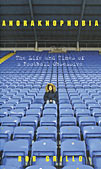 The Life and Times of a Football Obsessive
The Life and Times of a Football Obsessive
by Rob Grillo
The History Press, £9.99
Reviewed by Pete Green
From WSC 254 April 2008
Mainstream culture has reached a peculiar position with regard to knowing things. On BBC1’s The One Show recently, an expert guest prefixed one interesting contribution with the phrase “Sorry to be a nerd, but…” Think about that for a moment: he was invited on to the show specifically to share his knowledge about a particular subject, yet deemed it necessary to apologise for doing so.
It may be socially necessary to hold a limited amount of knowledge about certain approved subjects – celebrities, TV, Premier League football – but it invites the charge of anorakdom to know too much, or to know about the “wrong” subjects – trains, birds, Star Trek, or grassroots football. Rob Grillo’s purpose in Anoraknophobia, a memoir of his life obsessing over the one-man-and-a-dog end of the sport, is to query the stereotyping attached to this arbitrary value system. Yes, my friends and I are anoraks, he says, but we are not the maladjusted mouth-breathers of adland lore: we are normal people like you.
This is convincing when he demonstrates that they are family men with healthy social lives, but less so when he explores the term’s etymology (pirate radio, he reckons) and confusedly cites the retro chic of the parka (an entirely distinct item from the anorak, to this fashion anorak). As style issues go, clothing is less serious than prose, and even as the author dons his “functional and stylish Gore-Tex jacket” to battle the popular perception of anoraks’ sartorial ineptitude, terms such as “methinks” and “our good selves” make it difficult not to start reading the text aloud in that John-Major-with-laryngitis croak that is the universal signifier of nerd.
There is a degree of self-consciousness in this, as if to parody the stereotype. But as the banality rolls on, it’s unclear where the irony ends. Grillo introduces a friend as “one of the most foremost anoraks” and relates an upturn in his refereeing career with the similarly tautologous and weirdly formal phrase “there was then a subsequent rise in status”. The lifestyle is innocuous enough, but the writing has all the elegance of polyester slacks.
For all that this anorak vernacular can grate like hell, its dryness can be funny when it’s not overdone, and Grillo does an endearing line in self-deprecation. The point that we all have an inner anorak is borne out as the reader recognises aspects of the obsession – from Subbuteo to “the real thing itself” on the terraces at Silsden FC, managing school teams and obsessing over the Australian teams seen on the summertime pools coupons. Grillo is at his best when at his boldest, as in a lovely passage describing a Zen-like solitary pilgrimage to the deserted ground of Bradley Rangers.
Whether this is enough, in a little 189-page paperback, to justify the price tag is moot. If you’re strongly averse to cliches, splice commas and plodding verbosity then you’d best steer clear, and as a sociology graduate the author might have looked deeper into the odd stigmas that have come to surround knowledge. But his book does a fair job of challenging them implicitly – and if you ever linger worryingly over the North West Counties League, you’ll be glad you’re not alone.